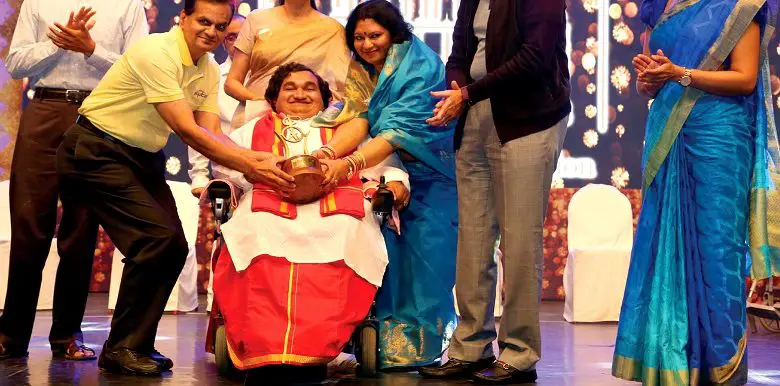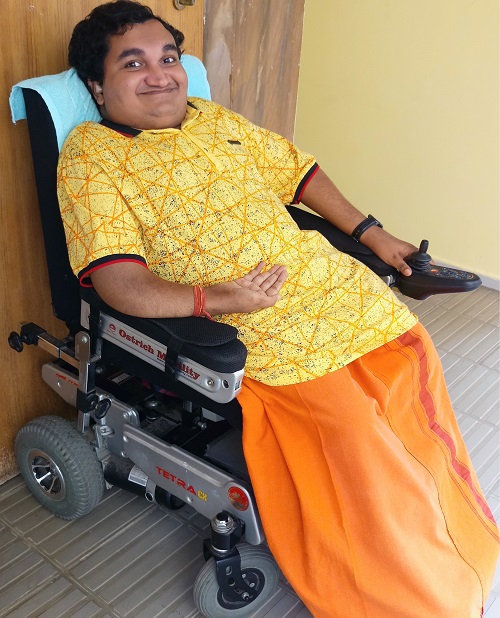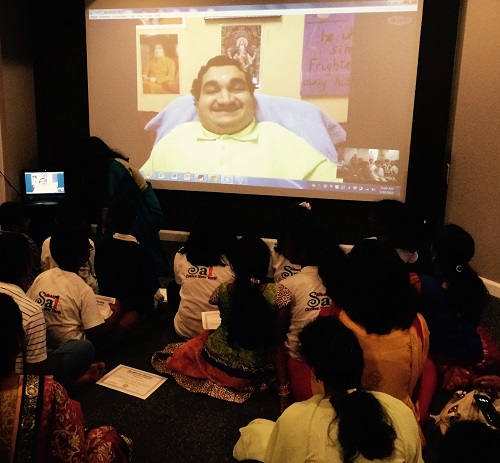
Knocking down disabling barriers through positivity
Sai Kaustuv Dasgupta is a name that has been hitting the international headlines for two reasons. Firstly, for his multi-creative talents – graphic design, motivational speaking, singing and composing, for which he has won many awards. Secondly, for the way he has turned his disability into a positive, not only for himself but also for millions around India and the wider world.
Disability Horizons’ writer Raya caught up with Sai for an exclusive interview about his life, his motivation and his determination to help others.
Can you please introduce yourself to Disability Horizons’ readers?
I live in Puttaparthi, India, with my family and am a graphic designer, motivational speaker, coach, disability-activist, singer and composer. I also have Osteogenesis Imperfecta, better known as Brittle Bones disease.
It is an extremely rare condition that has lead to me having more than 50 fractures to date. At present, all my joints are fully fixed and I cannot walk, so I use an electric wheelchair. Physically, I am unable to do anything on my own and am fully dependent on my parents.
I do graphic design by operating a mouse with my left hand and two fingers. I can’t reach the keyboard with my hands, but I can type by using a virtual on-screen keyboard.
As a child, I became well known for my classical singing, winning a Dishari award for the Best Child Singer of West Bengal in 2000. Over the years I got to perform before many famous singers. I have also composed more than 150 songs and released two cassettes, a DVD and MP3 audio albums with my own compositions.
In 2015 I penned a book called My Life, My Love, My Dear Swami, where I reflect upon my life, the struggles and my learnings from it.
In spite of being confined within four walls for much of my life, I have certainly broken all the walls of obstacles.
Life is full of challenges, obstacles and problems. But joy is also there if you face your barriers courageously. Life has taught me how to smile, and it can do the same for others, too.

What prompted you to become a disability-rights activist?
For six years, before I had my electric wheelchair, I was pretty much confined to my room. It put a great strain on my mental health and I suffered badly with depression. But, slowly, I realised that if I broke down like this, then what about the other differently-abled people who are also struggling to break barriers. How would they get motivated?
I had the desire to change my situation entirely, as well as that of others. Life had essentially given me two options. To spend my whole life confined into a small comfort zone, or to make a change and share my positivity and love with the whole world. So I set a goal to defeat all the obstacles in my way and to inspire others through the power of positivity and my journey.
As soon I started going out, it opened my eyes to the inaccessibility of the world. I was shocked to see the poor conditions around public places. It was clear to me that no one is aware of disability rights.
So I wanted to widen awareness about accessibility, or lack of it, in India. For me, this didn’t mean shouting in the road with placards, but discussing these challenges with the authorities and with the people who can implement change.
I have shown that everything is possible. I’ve turned my disability into my greatest gift. I strongly believe that my disability is nothing but my super ability.
What obstacles have you encountered in Indian society and when engaging in everyday life?
In India, disability is seen as a weakness. All my relatives and friends used to pity me. There was nothing in their minds except my health and my disability. Disabled people are made to feel different. We receive sympathy, but not help with making change happen.
In day-to-day life, there are so many things that are not accessible. This means that I, and others like me, can’t access all the public places. We are, therefore, automatically left out from many aspects of life.
I’ve also not received any financial help, despite having a severe disability. When I wanted to better myself through education, I couldn’t get a scholarship. When I did try to learn, I didn’t get any help or support from the school I had joined. In the end, I had to discontinue my education because I was not able to write properly and examination was too far away. Whatever I’m today, it’s only because of strong willpower.
Disability is not a weakness. In fact, disability has given me an extra dimension, additional skills and a new outlook.
Millions of disabled people around the world, including in India, live in conditions of extreme poverty. While the Indian Government appears to be demonstrating some commitment to meeting its obligations under the terms of the 2006 UN Convention on the Rights of Persons with Disabilities, real change is unlikely to come about unless Indian society itself becomes more accepting of people with disabilities and realise their potential.
However, the rapid growth of disability self-help groups appears to be empowering disabled people on a huge scale, enabling them to engage in economic activity, as well as raising their status in society.
The disability rights movement in India is still trying to register its presence in the public sphere. It has, however, undoubtedly touched the lives of masses of disabled people and pushed for a more disabled-friendly environment in the country.
When and how did you become a motivational speaker and coach?
I always love to smile in every situation – it has helped me to overcome so much adversity. When I accepted myself and found happiness and peace without even going outside, it became a cause of great inspiration. People started coming to me and I started motivating them. Slowly people started asking me to speak at events through Skype and I began to motivate mass audiences. As my life has seen so many ups and downs, people naturally seem to relate to it.
I love to inspire today’s young and students who want to discover the main purpose of their lives. I have conducted motivational sessions for PhD scholars of various institutes in different states of India, as well as those in countries including the US, Australia, Malaysia, Singapore, Thailand, Indonesia and Nepal.

People have forgotten how to smile naturally. They only smile while taking a selfie! So I want to inspire them in such a way that it will help them to regain their true nature and learn to smile wholeheartedly.
I also give sessions about disabled people’s abilities and how we can make changes to our lives. Whatever I have learnt from my own life, I just share them as experiences. I use this as a way to spread awareness about accessibility. Ultimately, I want to solve all the problems that I face in my daily life so that future generations won’t have to deal with them.
By Raya AlJadir
You can watch some of Sai Kaustuv Dasgupta’s motivational speeches on his YouTube channel.
Check out…
- Interview: Baroness Jane Campbell
- Top 10 international disabled celebrities
- We talk to disability rights activist who isn’t afraid to make his voice heard
Get in touch by messaging us on Facebook, tweeting us @DHorizons, emailing us at editor@disabilityhorizons.com or leaving your comments below.